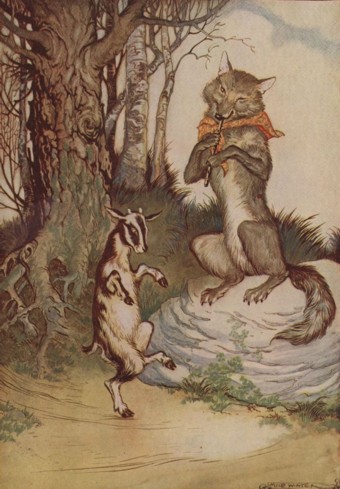| 1. pasture | /PAS-cher/ |
| -land covered with grass or similar plants suitable for animals, such as cows and sheep, to eat | |
| Our pasture was too small for our sheep so we bought more land. | |
| 2. heed | /heed/ |
| -to pay attention to something, especially advice or a warning | |
| The boy suffered a burn when he did not heed the warning. | |
| 3. bleat | /bleet/ |
| -the sound a sheep or a goat makes | |
| We can hear the bleats of the baby goats all the way across the field. | |
| 4. gaily | /GEY-lee/ |
| -happily or brightly | |
| She sang gaily when it was her turn in the talent show. | |
| 5. feast | /feest/ |
| -a large meal | |
| The villagers had a feast after getting a good harvest. |

He was all alone. The sun was sinking. Long shadows came creeping over the ground. A chilly little wind came creeping with them making scary noises in the grass. The Kid shivered as he thought of the terrible Wolf. Then he started wildly over the field, bleating for his mother. But not half-way, near a clump of trees, there was the Wolf!
The Kid knew there was little hope for him.
“Please, Mr. Wolf,” he said trembling, “I know you are going to eat me. But first please pipe me a tune, for I want to dance and be merry as long as I can.”
The Wolf liked the idea of a little music before eating, so he struck up a merry tune and the Kid leaped and frisked gaily.
Meanwhile, the flock was moving slowly homeward. In the still evening air, the Wolf’s piping carried far. The Shepherd Dogs pricked up their ears. They recognized the song the Wolf sings before a feast, and in a moment they were racing back to the pasture. The Wolf’s song ended suddenly, and as he ran, with the Dogs at his heels, he called himself a fool for turning piper to please a Kid, when he should have stuck to his butcher’s trade.
Do not let anything turn you from your purpose.
| 1. | What did the Kid do one night when the flock of goats make on their way home from the pasture? |
| 2. | What did the Wolf do before eating the Kid? |
| 3. | What did the Shepherd Dogs do upon hearing the Wolf’s song? |
| 1. | What should the Kid do the next time its mother calls out for it? |
| 2. | In your opinion, did the Kid do the right thing of tricking the Wolf into singing? |
| 3. | What do you think would happen if the Shepherd Dogs did not arrive at the scene? |
| 4. | The fable’s lesson is “Do not let anything turn you from your purpose.” Do you agree with this? Why or why not? |
| 5. | Have you experienced something similar to the fable’s lesson? Please tell me more about it. |
| Grammar 文法 |
Pronunciation 発音 | Vocabulary 単語 |
Comprehension 理解 |
|
|---|---|---|---|---|
 GOOD GOOD |
文法の誤りはほとんどなく、完全な文章で話すことができる | ほとんどの単語をはっきりと正しく発音することができる | 習った表現を適切に使うことができる | 文章を理解し、質問に正しく答えることができる |
 FAIR |
文法の誤りはあるが、完全な文章で話すことができる | 発音の練習が必要な言葉がいくつかある | たまにミスはあるが、習った表現を適切に使うことができる | 文章を完全に理解するのは難しく、質問に正しく答えられないときもある |
 POOR |
文章で話すのは難しく、単語だけで話すことができる | 発音の練習が必要である | 習った単語と表現を少しだけ使うことができる | 文章を理解するのは難しく、質問に答えるのは難しい |
An eBook from The Project Gutenberg.
This eBook is for the use of anyone anywhere at no cost and with almost no restrictions whatsoever. You may copy it, give it away or re-use it under the terms of the Project Gutenberg License included with this eBook or online at www.gutenberg.org